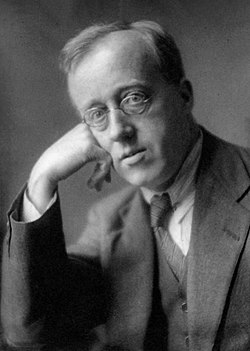Gustav Holst

Gustav Holst (21 September 1874 - 25 May 1934) was a famous English composer.[1][2] He was born in Cheltenham, Gloucestershire and studied at the Royal College of Music in London.[1][2] After leaving the College, Holst played the trombone in several orchestras and an opera company. Eventually, Holst became music master at St Paul’s Girls’ School and director of music at Morley College, both located in London.[1]
Holst had fragile health. As a child, he had asthma, "which often forced him to bed even after the simple act of climbing stairs." Frequently, he was unable to hold a regular pen due to neuritis.[2] He died at age 59.
Holst had many interests. He read Hindu epics and learned how to read Sanskrit. In addition, he believed in Dharma, an important concept in Hindu philosophy. Holt studied astronomy and astrology, and he even knew how to cast horoscopes. He read widely.[2]
Holst's most famous work of all is The Planets (1918). This is a suite of seven movements for orchestra, each about a different planet (the Earth is not included, and Pluto had not yet been discovered). The music does not really describe the planets or the Roman gods: instead, it was inspired by astrological symbols.[3]
References[change | change source]
- ↑ 1.0 1.1 1.2 "Gustav Holst". www.britannica.com. 13 March 2024. Retrieved 19 March 2024.
{{cite web}}: CS1 maint: url-status (link) - ↑ 2.0 2.1 2.2 2.3 Holst, Gustav (1981). Holst: The Planets. New York, N.Y.: CBS Records.
- ↑ Schwarm, Betsy (15 March 2024). "The Planets, Op. 32". www.britannica.com. Retrieved 19 March 2024.
{{cite web}}: CS1 maint: url-status (link)
Other websites[change | change source]
- www.GustavHolst.info
- List of compositions
- Gustav Holst: The Lost Films (Discovered 2009) Archived 2013-10-15 at the Wayback Machine
- Holst Birthplace Museum, Cheltenham Archived 2010-03-05 at the Wayback Machine
